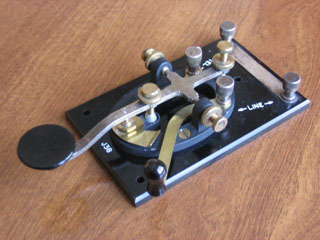Posted
on January 11, 2015
Back
in the day, before there was the internet, before there was the
telephone even, there was the telegraph. People were able to
communicate over long distances, quickly, using electrical signals. But that meant that every number and letter had
to be encoded as long-and-short electrical signals. The code
developed by Samuel Morse and Alfred Vail is now called the Morse
Code:
|
The Morse Code Alphabet
|
|||
|
A
.-
B -... C -.-. D -.. E . F ..-. G --. H .... I .. J .--- |
K
-.-
L .-.. M -- N -. O --- P .--. Q --.- R .-. S ... T - |
U
..-
V ...- W .-- X -..- Y -.-- Z --.. 0 ----- 1 .---- 2 ..--- 3 ...-- |
4
....-
5 ..... 6 -.... 7 --... 8 ---.. 9 ----. Fullstop .-.-.- Comma --..-- Query ..--.. |
We
commonly call the long-and-short signals “dashes” and “dots”
or “dahs” and “dits.”
 The
electrical telegraph signals were carried from place to place along a
wire, and some people became professionals skilled at sending and
interpreting telegraph signals.
The
electrical telegraph signals were carried from place to place along a
wire, and some people became professionals skilled at sending and
interpreting telegraph signals.
These
days, Morse Code is used mostly by amateur radio operators, but
pilots and air traffic controllers often learn it as well.
Today
has been set aside to encourage people to learn their name (at least)
in Morse Code. If you want to hear what your name sounds like in dits
and dahs, check out his translator.
Also
on this date:
Plan
ahead:
Check
out my Pinterest pages on:
And
here are my Pinterest boards for:





No comments:
Post a Comment